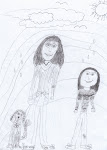
I was thinking we were through the worst of it. Silly.
Less than a week after my daughter admitted her fears I stole her from China, a story from the New York Times online edition appeared April 5th on the first page of the site, above the fold, announcing itself with a heavy black headline: Chinese Hunger for Sons Fuels Boys' Abductions, by Andrew Jacobs.
I wait till late at night, when I hear long, deep in and exhalations emanating from my daughter’s room, when she’s deep asleep, when it’s safe to click on a story without fearing two small eyes peering over my shoulder. Idle worry? Not when your daughter’s in third grade. Not when she was reading at a 6th grade level in the fall of 1st grade. She misses nothing.
The bulk of the story revolves around China’s demand for sons. Lacking any form of social security, Chinese families, especially poorer, rural families, yearn for a son, for someone who won’t marry and leave, for someone who will care for them in old age, for someone to continue the family bloodline. But the one-child-one family policy has frustrated this yearning. So now, more than ever, boys are in demand, in danger of abduction. Heartrending stuff in its own right. But then, a quote stops me cold:
A grieving father of a four year old boy, Peng Gaofeng, started an ad hoc group for parents of stolen children. His claim? Girls are abducted as well -- and some of these girls are sold to orphanages. They are the lucky ones Peng says. These girls often end up in the United States or Europe after adoptive parents pay fees to orphanages that average $5,000.
It feels like a punch to the gut.
The claim makes no sense. To even entertain the possibility, that I could have been an unwitting accomplice, that I could have taken a child from her family, sickens me.
I finish the article but there is no further mention, evidence, or explanation regarding these supposedly abducted girls. The focus returns to the issue of boys and China’s desire for sons.
I write Jacobs to ask (politely) what this claim is founded on. If it makes any sense for China’s orphanages to pay for girls when the orphanages are flooded with more girls than they can handle. Does he have any idea how this claim might hit adoptive families in this country? Can he substantiate the claim with hard data? Answers would be helpful.
I have yet to hear from Jacobs.
Adopting a child from this country, as a single parent, was never an option for me. I’d never thought about adopting, much less looked to China, till a friend graciously served up the idea. I’m not one to move into big decisions lightly (an understatement... I can hear friends chortling.) I weighed my decision carefully, asked the hard questions, gathered the data over months, in truth, years.
Was it right to pull a child from her country, her culture?

My understanding was that there were hundreds of thousands of girls in China, that domestic adoption was uncommon in a country where families held an overwhelming bias and preference for blood ties. Hundreds of girls needed families, loving care. Orphanages were underfunded, understaffed, and overwhelmed.
It all made so much sense: me, wanting to love and raise a daughter. All those girls in China needing a home.
I adopted my daughter in 2001 and these larger existential, philosophical, moral questions were instantly relegated to the furthest recesses of my mind as everyday demands overwhelmed me: bottles, diapers, Desitan, formula, feeding schedules, nap schedules, bath routines, bedtime routines, books, teddy bears, dolls, nursery rhymes, nonsensical rhymes, hand games, finger games, food games, numbers, colors, letters. Such joyful days. An innocent interlude.
Eight years later we’ve come full circle. But now it’s my daughter asking these questions.
How could I have been born to one family, … and ended up with another, half a world away? How could my parents have given me up?
Knowing her as I do, loving her as I do, I hear these questions in a new light. They have new meaning, new urgency. Worse, a harder question confronts me:
Could I somehow be …culpable?
Its insane to consider. But I don’t like avoiding hard questions. In the face of bad news, I want to know the worst, confront the truths, then deal with them.
I dig out Kay Ann Johnson’s book, Wanting a Daughter, Needing a Son. Johnson, a professor of Hampshire College with her own daughter from China, spent ten years researching the elusive story of abandonment, adoption, and orphanage care in China. She published her book in 2004. A friend recommended it. I’d promptly bought it – and shelved it.
Johnson’s book is full of hard data. I’m a former MBA. Hard data is my friend.
China’s one-child policy was initiated under Deng Xiaoping in 1979 in an effort to control China’s population. Resistance to the one-child policy was most widespread in the countryside – where 75-80% of the population then resided, scraping a difficult existence off of the land.

In the 80’s, desperate families developed private work-arounds. Yes, some aborted. Yes, some left their daughters out in a field or on the roadside to die. But many others hid their girls or quietly, informally, adopted their girls out to family, neighbors, or friends. In the early 90’s, authorities responded to this subterfuge with what appeared to be greater leniency, offering a “one-son or two-child” policy for the countryside. But they matched this leniency with stricter laws going beyond a narrow focus on births to address the loophole: informal adoption.
Cadres of birth planning workers blanketed the countryside to monitor household head counts and reproductive behaviors. Penalties for violating birth planning laws were as harsh for adoptive families as birth families and included stiff fines (anywhere from one, to five, to even ten years’ worth of wages,) lost promotions, lost jobs, forced abortions, sterilizations, as well as public humiliation via tv and radio. (How easily we forget what it means to be free...)
Still, babies were born.
Thousands of brave families continued to adopt abandoned girls in the face of great personal cost and risk -- and another problem emerged. None of these girls could be registered at birth or beyond. They weren’t supposed to exist. But lacking formal registration, they also lacked basic civil, legal, and medical benefits: the right to go to school, the right to basic medical care, innoculations, or the right to reside in a given region or district. Those girls who made it to school were targets of derision – as if in fact they had no right to exist.
With fewer options to hide or care for the children, the number of abandonments soared.
State orphanages maintained a low profile to obscure their purpose. Signs suggested a preschool, or kindergarten, or children’s dance institute. Or there were no signs. Or the entrance was hidden. The fear was that if these places were discovered, their purpose known, they’d be flooded with babies.
They were flooded anyway. And flooded with healthy children. In the years preceding the one-child policy, Johnson estimates roughly 90% of abandoned children in orphanages were disabled. But by the 1990’s Johnson found that, for example, in her daughter’s state-run orphanage, fewer than 20% of the children had any known disability.
Overwhelmed with children, China's state-run orphanages grappled with mortality rates as high as 40%. In smaller, more remote areas, mortality rates approached 80%.
Foreign adoption was viewed as a way for the government to release some of the pressure, to provide some of the children with homes, to bring in much needed funds -- while still masking the problem.
Conditions in China’s orphanages have since improved. The government has slowly owned up to the problem and turned to the public for funds while also easing some of the restrictions on domestic adoption. Foreign money has helped. Over the last decade, Johnson estimates international adoption fees brought in more than $100 million. (Part of the cost of my daughter’s adoption was a required donation of $3,000 in support of her orphanage.) But, in her book, Johnson also raises a troubling possibility. Would China become dependent on foreign adoption? Was it too lucrative?
I wrote Johnson to thank her for her book and ask about recent developments. Had she seen Jacobs’ New York Times article? She is currently working on a grant to pursue further research in China. With a scholar’s caution, she was reluctant to be quoted. She generously shared her sense that the situation in China hadn’t yet changed in the time I adopted my daughter (2001.) But she also senses things have changed in the past four or five years. Domestic adoptions have increased. And now, there are far fewer healthy girls in orphanages. She is wary.
I confide my worries to a friend, a mother of two. What kinds of things will my daughter read as she grows older? What will she think? Did I contribute to something, in some small way, that’s beyond my wildest imagining?
She’s not an adoptive parent. She tells me we can’t control what happens in the world or what our kids hear. I know she is right. I can’t change what happened or what’s currently happening in China. And I can’t protect my daughter (protect myself?) forever. I can only hold her and love her.
Still, I never truly understood the extent of my vulnerability as an adoptive parent. Till now.






3 comments:
"Still, I never truly understood the extent of my vulnerability as an adoptive parent. Till now."
Yes, it is a tremendously vulnerable feeling. It feels like being constantly in the public eye, required to justify to 2 different countries the decisions you have made and continue to make. And you're right - you can't change what your kids learn; you can just be forthright about how you feel and what you knew, and be as supportive as you can.
Thanks for the summary of Kay Johnson's book. I've read it but saved your post for future reference for my kids. You've also really captured the heart-clenching worry that we parents through adoption have. I am somewhat skeptical of the current stories about baby selling or theft. I believe it does happen, in a country as large as China it's bound to happen. But the suddenness of the stories has the scent about it of political policy change. It just so reminds me of other times when China made a big shift in policy (which it does radically and quickly) and then with its control of the media, justified it without even mentioning the change of policy, all the more effective. I'm also for hard data, even though I'm a writer not a scientist, and I'm interested in what Johnson will discover. I am also personally reassured by Johnson's book and glad you reminded me of it.
Hi Lilian,
I wonder you're onto something. It would certainly be creepy if it were some kind of PR ploy on the part of the Chinese government, attempting to place blame for foreign adoptions on the black market. The original reason for opening the door to foreign adoptions was to address and mask an increasingly out of control, desperate situation from the Chinese people themselves. Children needed families and care. Foreign aid was needed to help the orphanages which were overwhelmed. As I understand it, the mortality rates were frighteningly high.
Thanks again for stopping by Lilian.
Lisa
Post a Comment